The World's Largest Hackathon: A Recap of Space Apps Weekend 2017
69 countries, over 61 last year....
187 locations, over 161 last year....
~25,000 participants, over approximately 15,000 last year....
A reach of 40 million people with the #SpaceApps hashtag!*
The international growth of Space Apps this year has been astonishing! We in the Space Apps Global Organizing Team thought we would break the record numbers set by last year’s competition, but we had no idea it would be by this much!
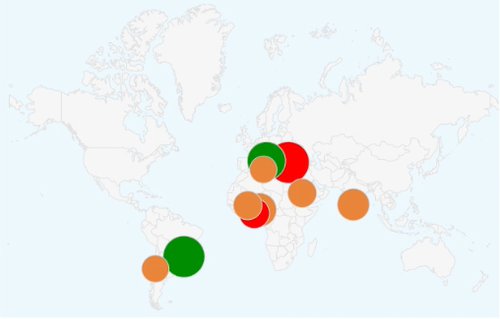
We could see the Space Apps community spring into action on our servers this weekend, as contestants across the world woke up and started hacking on Saturday and Sunday. The flurry of activity steadily moved westward throughout the weekend, following the daytime! (That was fun to watch!)
As the sun isnow setting over the 6th annual International Space AppsChallenge, the final presentations are wrapping up, and the first round oflocal judging is being completed. We areeager to know: what was your experience of Space Apps this year? Were you aparticipant, a host, a judge, a subject matter expert, or part of the onlineaudience watching the livestreams from numerous locations?
Let’s take a global view of what transpired at the world’sbiggest hackathon this weekend! The Space Apps in Melbourne, Australia, was geographicallyone of the first to start.
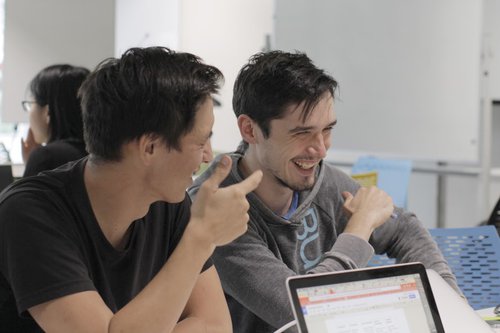 On Friday evening the local host, Troy McCann, spoke with AndreaBoyd, a Flight Controller for the International Space Station. It isn’t very common to have Australiansinvolved in the space industry at such a high level. The Space Apps crowd really enjoyed hearingfrom her, particularly when she explained how astronauts handle medicalemergencies in space.
On Friday evening the local host, Troy McCann, spoke with AndreaBoyd, a Flight Controller for the International Space Station. It isn’t very common to have Australiansinvolved in the space industry at such a high level. The Space Apps crowd really enjoyed hearingfrom her, particularly when she explained how astronauts handle medicalemergencies in space.
On Sunday morning, the Melbourne group heard from thefascinating Andrew Aldrin—sonof Buzz Aldrin—who is working in the launch and education areas of the spaceindustry himself. He is helping set up acourse to prepare people for the “new” space industry (meaning theentrepreneurial approach). Andrew also said that he would like to see peopleinvesting in propulsion from the moon and space manufacturing—building thingson the moon itself and launching from there.
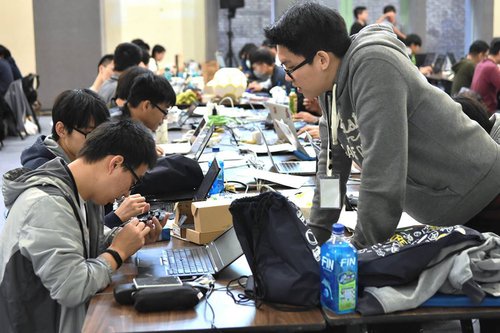 Taipei, Taiwan, became a first-time Space Apps host in 2017,welcoming a total of 57 teams comprised of 214 participants to the hackathon atNational Taiwan University.
Taipei, Taiwan, became a first-time Space Apps host in 2017,welcoming a total of 57 teams comprised of 214 participants to the hackathon atNational Taiwan University.
In a video prior to the event, Space Apps Taipeiparticipants proclaimed, “We are ready to step on the stage, take thechallenge, brainstorm our minds, explore the unknown. Let’s work together andshow the world our creativity and possibility!"
Projects produced at the first Taipei Space Apps competition include Astrohackers in Taiwan, a game to educate players about the definitions of Earth-related scientific terms, and UpperEast, unleashing the power of NASA data, including using Google Earth to display volcano, aerosol, and rain data. The Taipei group even produced a time-lapse video of teams working!
We are ready to step on the stage, take the challenge, brainstorm our minds, explore the unknown. Let’s work together and show the world our creativity and possibility!Space Apps Taipei Participants
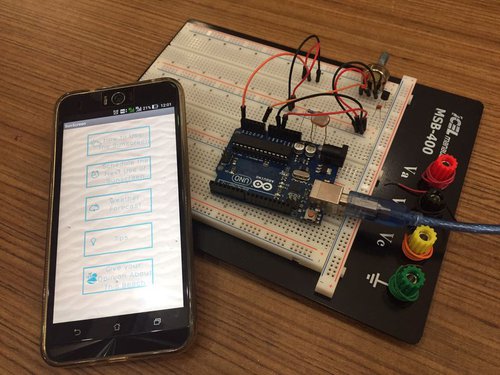 Space Apps Maringá,Brazil, was another first-time host this year! First place was awarded to HereComes the Sun, presenting a mobile app called TheSunscreen, created to provide real-time sun data to beach-goers, in order toinform users of local percentage of sun incidence, tips to improve the beachexperience, and precautionary measures, in order to prevent skin diseases andsun damage. The project was submitted as part of our Let’s Go to the Beachchallenge. See Maringá’s winning teamshere.
Space Apps Maringá,Brazil, was another first-time host this year! First place was awarded to HereComes the Sun, presenting a mobile app called TheSunscreen, created to provide real-time sun data to beach-goers, in order toinform users of local percentage of sun incidence, tips to improve the beachexperience, and precautionary measures, in order to prevent skin diseases andsun damage. The project was submitted as part of our Let’s Go to the Beachchallenge. See Maringá’s winning teamshere.
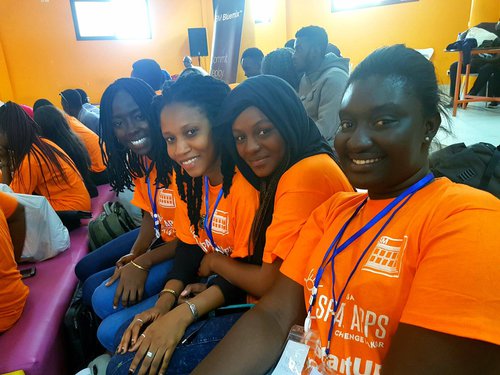
Meet team AfricApps from Space Apps Dakar. Thisteam chose the Bring Your Own Solution option for this year’s Space Apps: "AfricApps is a download web platform for developers and a mobile one for users that willallow African developers to sell their applications. AfricApps will be thefirst African store integrated in your mobile phone!"
In its fifth year, Space Apps Kathmandu became home to more than 15 projects. These included Grow Tech Nepal, a digital hydroponics farming system supported by data analysis of crops; Team Dark, a real time wind warning system; and Siren, a project aimed at making locals aware of natural disasters. The winning project at the hackathon was Smart Agriculture.
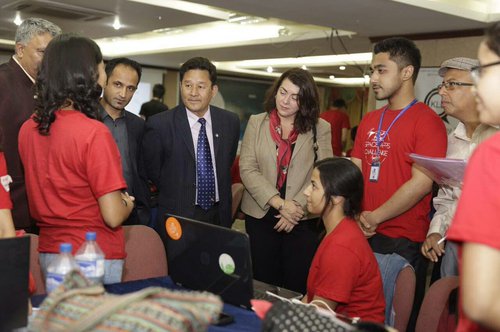
Space Apps Kathmandu was hosted by the International Centre for Integrated Mountain Development (ICIMOD), which is also the home of SERVIR-Himalaya. SERVIR represents a partnership between NASA and the U.S. Agency for International Development (USAID), with the goal of connecting "space to village" to help "developing countries use information provided by Earth observing satellites and geospatial technologies to manage climate risks and land use."
At Space Apps in Rome, Italy, once again, the community cameout to support the competition in full force! Space Apps Rome was a hugesuccess, with more than 100 participants coming together to spend the weekendhacking at La Sapienza University. Thehackathon in Rome is organized through a special collaboration with the U.S.Embassy, the European Space Agency, and others. Space Apps Rome has featured multiple former Global Awardwinners over the years, and members of those teams were on-hand to mentorteams, support the organizers, and catch up with one another throughout theweekend.
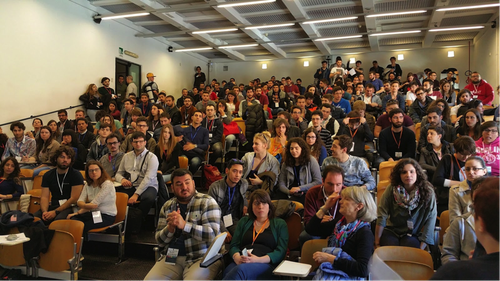 On Friday morning, the group checked in with other Italiansites in Vicenza and Napoli so that the events might give each other a salute. This national andregional collaboration is an example of many we saw this weekend, all part ofthe broad international collaboration that makes Space Apps so inspiring!
On Friday morning, the group checked in with other Italiansites in Vicenza and Napoli so that the events might give each other a salute. This national andregional collaboration is an example of many we saw this weekend, all part ofthe broad international collaboration that makes Space Apps so inspiring!
Space Apps Rome is like one big family—and a family I was deeply grateful to be able to spend time with this weekend!Blake Garcia, SecondMuse, Space Apps Global Organizing Team
“Space Apps Rome is like one big family—and a family I was deeply grateful to be able to spend time with this weekend,” says Blake Garcia of SecondMuse, who leads community management for the Global Space Apps Organizing Team in the U.S. If you were a Space Apps host over the past few years, you got to know the amazing Blake during your orientation and planning processes! Blake traveled to Italy to help kick off the hackathon in Rome and gave the excited crowd some inspiring words, featured in the Huffington Post yesterday.
And now, here’s some guidance from Blake about this year’s judging and awards processes!
Judging and Awards

Over the next month, the community will be waiting inanticipation for the global judging results. After Space Apps weekend, global judging andlocal People’s Choice Award nominees have until Friday, May 5th, at11:59pm (local) to create their 30-secondproject videos. NASA judges will spend the next month reviewing the globaljudging nominees. We will announce the finalists at the end of the month, andthe winners will be announced in early June. Teams will compete for awards in 5categories:
- Best Use of Data: The solution that best makes space data accessible, orleverages it to a unique application.
- Best Use of Hardware: The solution that exemplifies the mostinnovative use of hardware.
- Best Mission Concept: The solution with the most plausiblesolution concept and design.
- Galactic Impact: The solution with the most potential toimprove life on Earth or in the Universe.
- Most Inspirational: The solution that captures our hearts.
- We can’t forget about the People’s Choice! Each locationnominates their community’s favorite project to go on to the global People’sChoice Award vote. Starting on Monday, May 8th, members of the public will beable to vote once per day for their favorite project on spaceappschallenge.org. After twoweeks of voting, the five projects receiving the most votes will be selected and voting will only be open on those projects in the final two weeks. The fiveprojects will do a big campaign for votes over the last two weeks, so be sureto vote to help determine the winner.
Global award winners (including the People’s Choice Award)will be invited to attend a NASA launch event at a date to be announced.
Were you a part of Space Apps 2017? Tell us about it!
- @spaceapps
- Facebook.com/SpaceAppsChallenge
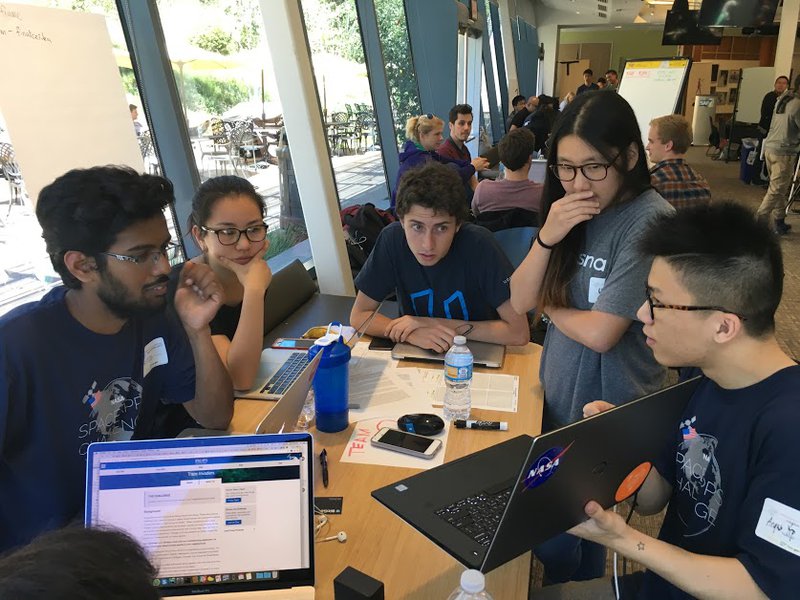
Special thanks to Blake Garcia, Matt Scott, and Davar Ardalan and all the Space Apps locations mentioned here for their contributions to this article.
*Hashtag data is for the timeframe between March 31–April 30 on Twitter and Instagram.